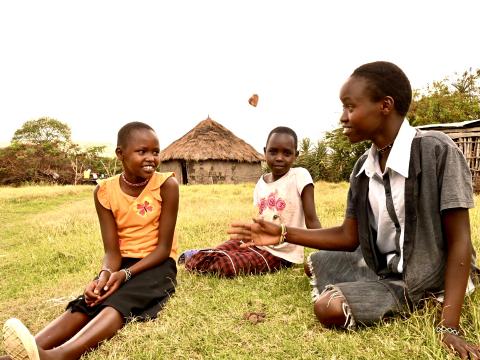Saving a Generation: Girl On a Mission to End FGM

By Irene Sinoya, World Vision Communications Specialist, Kenya
Zipporah, aged 15, is determined to save girls in her community from Female Genital Mutilation (FGM) and child marriage in her village in Narok County, Kenya.
In her Maasai community, some families still embrace retrogressive cultural practices that encourage parents to marry off their children at a very tender age, in exchange for dowry that increases household wealth.

Children are at risk of such practices in this time of COVID-19, as they have been home for over six months (since March 2020), after the government closed learning institutions in a bid to curb the spread of COVID-19 in Kenya.
“Many young girls are idle, with nothing much to occupy them since schools are closed. Therefore, they can easily be influenced or forced to undergo FGM in preparation for marriage. I can’t stand that! So I am sensitising the girls to protect them from such harmful practices,” she says.
Zipporah admits that previously, she did not understand the dangers brought by some of the community's cultural practices.
“I did not know the dangers of FGM until when my friend in the neighbouring village was cut. She lost a lot of blood and finally died. She was in so much pain,” says Zipporah sadly.
She notes that her mind was eventually ‘opened’ after she attended World Vision’s training on child protection rights. During that forum, she realised that FGM was a violation of children’s rights and also learned about its dangers.

Upon the successful completion of the training, Zipporah vowed to empower her friends to become child protection rights champions.
“Since the death of my friend, I have never wished to witness any other girl undergoing FGM. World Vision’s training has been of great help. I am using the knowledge to encourage my friends to refrain from the harmful activities,” she adds.
Every evening, the girls usually gather at a common site in their village to study and play. They also share some of the challenges they face as teenagers and come up with different coping mechanisms.

Zipporah has encouraged her friends to embrace education and attend church services instead of thinking about FGM and child marriage, which is rampant in their community.
The girls on the other hand have played a major role in educating their parents on the effects of FGM, which has helped to reduce the number of cases.
They also act as watchdogs in their village by reporting cases of violence to relevant authorities such as the area chief and World Vision’s child protection officers.

Zipporah’s mother Naila – aged 47 - also encourages parents to abandon the practices, terming them as barbaric. Some years back, her parents also forced her to undergo the cut and later married her off.
“Despite many parents coercing their children to undergo FGM, the practice has never helped those children. Instead, it makes the girls feel ready to get a husband and start a family of their own”, says Naila, Zipporah’s mother.
“FGM also makes women to develop complications after growing up. The significant pain and heavy bleeding never goes away and often recurs during, and after childbirth,” she adds.

Apart from working with the government to eradicate the dehumanising acts in the community, World Vision is also working with religious leaders who have turned the tide on child protection by inspiring communities to abandon FGM and keep children safe during this time of COVID-19.
The majority of circumcisers in the community who have been reached have promised to become anti-FGM advocates in the community.